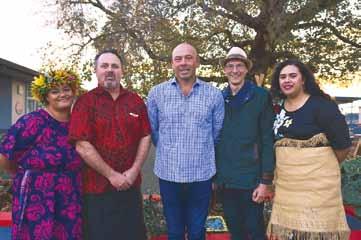
11 minute read
preSIDeNt’S peN
EdiTOr Liz Hawes executive Officer pO box 25380 Wellington 6146 ph: 04 471 2338 email: Liz.Hawes@nzpf.ac.nz MagaziNE PrOOf-rEadEr Helen kinsey-Wightman EdiTOrial BOard perry rush, NZpf president geoff Lovegrove, retired principal, feilding Liz Hawes, editor
advErTiSiNg For all advertising enquiries contact: Cervin Media Ltd pO box 68450, Victoria St West, Auckland 1142 ph: 09 360 8700 or fax: 09 360 8701
NOTE the articles in New Zealand Principal do not necessarily reflect the policy of the New Zealand principals’ federation. readers are welcome to use or reprint material if proper acknowledgement is made. SuBSCriPTiON Distributed free to all schools in New Zealand. for individual subscribers, send $40 per year to: New Zealand principals’ federation National Office, pO box 25380, Wellington 6146 New Zealand Principal is published by cervin media Ltd on behalf of the New Zealand principals’ federation and is issued four times annually. for all enquiries regarding editorial contributions, please contact the editor.
ISSN 0112-403X (print) ISSN 1179-4372 (Online) 2 eDItOrIAL
Liz Hawes, editor
3 preSIDeNt’S peN
perry rush
8 pAcIfIc eDucAtION pLAN trANSLAteD INtO ActION
Jason Swann, principal, Otahuhu primary School tALANOA At StANHOpe rOAD ScHOOL 18 WHAt DID tHe fINAL tOmOrrOW’S ScHOOLS repOrt recOmmeND?
Dr cathy Wylie, NZcer
23 WHeN cOVID StrIkeS Our ScHOOL: cOmmuNIcAtION AND mANAgemeNt StrAtegIeS pApAtOetOe HIgH ScHOOL
reprinted with permission of ‘the Writing room’
27 tHe bIg 7
David mckenzie, principal edendale primary School, Southland
31 DANce StuDIeS – DANce AND pOLItIcS, LeADerSHIp AND INcLuSION
professor Nicholas rowe, Auckland university
37 kIA HIWA rā
martin thrupp
39 OpINION – ‘tAkINg A StreNgtHS bASeD, SOLutION fOcuSSeD ApprOAcH tO AtteNDANce’
Helen kinsey-Wightman
PHOTOS FOR THE MAGAZINE: If you have any photos showing ‘New Zealand Schools at Work’, particularly any good shots of pupils, teachers or leadership staff, they would be welcome. the appropriate permission is required before we can print any photos.
TECHNICAL dETAILS: good-quality original photos can be scanned, and digital photos must be of sufficient resolution for high-quality publishing. (Images should be at least 120 mm (wide) at 300 dpi). please contact cervin media Ltd for further details. phone: 09 360 8700 or email: education@cervinmedia.co.nz
8
cover image kim gee
MAGAZINE You can now access the current and past issues of NZ Principal magazine online You can search by magazine issue, article name or author
visit www.nzprincipal.co.nz
Editorial
Liz Hawes Editor
eDucAtION AND pOLItIcS co-exist in the likeness of conjoined twins. The difference is that every effort is made to separate conjoined twins so each can thrive independently. Not so with politics and education.
It would appear that the education-political nexus shares far too many critical functions for any Government to risk separation. This in turn creates issues for educationalists. As Martin Thrupp so eloquently writes in this issue (p.37), ‘It often doesn’t matter how good an idea is educationally speaking, unless it is supported by the Government in power it’s not going to fly. For instance, many of us in the sector worked for years to get rid of National Standards but it was only a change of government in 2017 that saw them removed.’
And so it has been throughout history in Āotearoa New Zealand. Good and bad educational policies are liberally flung about during election campaigns. No matter how stridently independent experts might critique the education policies on offer, voters must equally consider policies relating to the many other spheres of interest. The party gaining ascendency will implement the education policy it campaigned on, irrespective of its educational merits.
Education has been used to shape citizens’ thinking, values, beliefs and knowledge in ways that reflect a Government’s ideology and policies, not just in Āotearoa New Zealand but everywhere. Schools reflect the social values of any given state at any given time. Education is the tool used to create citizens of the future, engendering the knowledge and skills which the Government has decided will build a successful nation.
So, it is not just in preparing young people for the world of work, that schools have a role, it is equally preparing them for the kind of society we will live in. According to Staeheli (2011), ‘Schools can be thought of as an aggregation of the values, aspirations and ideals held by society and sites where a range of strategies are employed to attempt to shape young citizens in certain ways.’
Over the years we have witnessed this in action. We have seen young Māori deliberately steered into physical labouring and agricultural futures, because it was politically agreed that they were best suited to this work; Post World War Two, children were prepared for factory and manufacturing work, with an emphasis on punctuality, obedience, order and allegiance to the flag, to help the nation recover in the wake of war; in modern times we have seen exams, streaming and timetabling used as tools to draft young people into particular work-life options. Education
is rarely seen as a mechanism for recognising individual talent and drawing that talent out for development, irrespective of political imperatives. ‘it often doesn’t We have observed, even in our universities, degree options in the Arts and Humanities MATTER HOw pared back and resources poured into options leading to areas in which the country has GOOd AN IdEA IS educationally perceived skill shortages, such as engineering, sciences, mathematics and technology. Some would argue that education sites are no more speaking, unless it than a device for economic and cultural reproduction and operate far from the ideal is SuPPORTEd by THE GOvERNMENT of emancipation of the learner. Education has taken on a role in creating social cohesion, as much as preparing young people to contribute IN POwER it’s not to the economic prosperity of the nation. Where education is funded by the state, it going to fly. is not unreasonable that Government would want a say in the provision of education, given it is accountable for public spending. The question is how much influence should Government have? Reducing the influence of Government in developing education policies and systems is not a new idea. Educational professionals have long been calling for greater independence so that long term education goals can be set and embedded without constantly wrestling the vagaries of the three-year political cycle. The widely supported New Zealand Curriculum (NZC), is a case in point. With its national framework, localised flavour, breadth and richness, the curriculum was enthusiastically anticipated. The sector looked forward to implementing the innovative, exciting approach to learning, for many years to come. As politics would have it, before the curriculum was embedded, a new Government had completely derailed schools’ plans and only now, a decade later, with another change in Government, is curriculum again the focus. The detrimental effects of the derailment are obvious for all to see. There has been a drop in achievement levels in all the core learning areas, and some schools are now struggling to work out what is national curriculum and what is local. The new NZC was shaken off course by political change. There is an opportunity right now, in the wake of the Tomorrow’s Schools policy review, to establish Education Services Agencies (ESAs) [replacing Ministry of Education Regional Offices] at arm’s length from Government and the Ministry, as recommended by the review task force. That would give confidence to the sector that at least ESAs would be independent from political interference. It would not signal a complete separation of the conjoined twins but it would be a great start.
PrESidEnt’S PEn
perry rush national PrESidEnt, nEw ZEaland PrinciPalS’ FEdEration

fOr tHe pASt 20 years educators have sought to articulate what students need to learn in a rapidly changing world.
Such a notion poses a challenge to a schooling system that had hitherto enshrined the provision of a teacher who was a font of knowledge expert in curriculum content. This approach reflected the nature of the knowledge economy, a place where knowledge could be learned because it was finite and therefore could be organised within a school curriculum and taught by a teacher.
The advent of the internet and the explosion of available knowledge changed that. Knowledge was viewed as secondary to competency-based approaches that positioned the learner as a researcher of the world, able to deploy learning tools to utilise knowledge in response to real-time problems.
However, while ‘learning how to learn’ is important, we are now seeing the folly of delegitimising the place of knowledge in our curriculum and of casting our teachers as coaches.
The risk of such an approach is that students become competent collaborators, co-creators, anywhere-anytime learners, but about what in particular?
To be a collaborator and co-creator to meet the challenges of the future requires not only learner attributes but knowledge as ‘food for the mind’. Such knowledge in a national system of education should be important and foundational. We must guard against the dysphoria that comes from the view that ‘any’ knowledge is appropriate. Such an approach undermines the integrity of a teaching workforce built on the efficacy of the teaching act and coherence of content. Since the advent of the revised NZC (2007) teachers have tried to make clear sense of the generic curriculum and found it difficult to act as arbiters of challenging, discipline-based learning. Increasingly young people have been expected to choose what they want to learn. This is a recipe for students choosing what they already know. It is difficult for a student to recognise important new knowledge if they do not know what counts as important. Our national curriculum has always played a vital role in articulating this for our teachers who, as professionals, lead young people into knowing.
We have privileged student ‘choice’ and in doing so have let go of the reins of a national education system and teaching as an intentional act. This challenge is captured in the philosopher Immanuel Kant’s (1871) famous dictum, ‘Thoughts without content are empty’.
The expectation that the New Zealand Curriculum (NZC)
be localised has further confused matters. The recent NZPF/ Ministry of Education curriculum road trip exposed the lack of a clear definition of localisation. Many principals hold the AdvENT OF widely divergent definitions. Some viewed localisation to be engaging with iwi and THE INTERNET and hapū to understand and then teach local knowledge particular to tangata whenua. the ExPLOSION OF AvAILAbLE Some judged localisation to be the freedom to sift and sort the national curriculum so that local curriculum paid prioritised attention to kNOwLEdGE aspects of the national curriculum, and others thought localisation is delivering the full scope changed that. of the national curriculum but through local contexts. Such divergent views will clearly impact on national coherence. Engaging resources empowered learning
big books for the shared reading experience student and library books teachers’ notes included curriculum-aligned positive psychology wellbeing resilience
emotional intelligence Enlighten Press become a wellbeing school with enlighten press


An urgent and clear definition is needed. There is yet another critical question that localisation raises, that is the tension between local knowledge (important to individuals, communities and cultures) and universal knowledge (important across communities, countries and cultures). This universal property is the imperative of education systems in democratic nations; an imperative which accepts that all children, no matter their background or circumstances, have a right to knowledge which enables them to generalise beyond the confines of their experiences. Such knowledge grows understanding outside of oneself and one’s own sphere of reality, a key learning process for young people who by dint of their age, are limited in their experience of the world.
Both are legitimate but the role of local and universal knowledge and the relationship between them is not made clear in the NZC.
A clear and unequivocal understanding of the role of knowledge within national curriculum is vital and of particular importance in a profession that is struggling to make sense of the role of knowledge in a world crammed with information.
The teaching profession needs to know – to what should they pay attention?
We have been implementing a localised curriculum and doing so with little clear guidance about what localisation means. Further, we have been localising curriculum in the most deregulated schooling system in the world where we have little horizontal connection between schools and where every school we have been is expected to reinvent the wheel. The implication of a move to focus on IMPLEMENTING competencies has substantially disabled teachers’ deep curriculum knowledge. Despite the huge A C LOCALISEd uRRICuLuM explosion in information caused by technology, we are learning that humans still need to be led towards important understandings that reflect and doing so with our goals as a nation. It is a teacher’s job to do this. LITTLE CLEAR GuIdANCE about While we no longer have finite, narrow fonts of knowledge to teach, such is the nature of the information age, we do still need to teach what localisation important knowledge. We must do everything we can to eliminate the huge and unnecessary means. workload associated with the constant demand to generate curriculum. Instead, we should focus the Ministry of Education on being clear about ‘what’ should be taught and the teaching workforce on ‘how’ curriculum should be taught.
Education services is NZ’s largest and most popular school accounting provider.
Our clients choose us for many reasons – but a few that come up regularly are; 1) Our people – we work with you and come to your site. We partner you with a school accounting professional. 2) Our flexibility – any software you choose – xero, MYOB or our free software – and our reports are school specific – not some business model that is not fit for purpose. 3) Reduce risk of fraud and misappropriation (and time spent at the school) by using our creditor payment service.
Come and find out why over 740 of your colleagues use Education Services Limited – and have real peace of mind.

For a no obligation free demo and quote contact Pete on 027 243 5785 or e: pete @educationservices.co.nz





